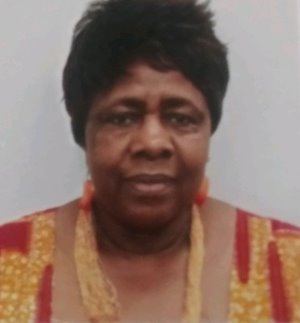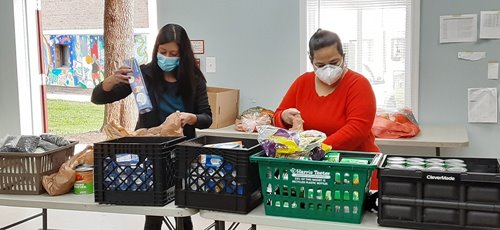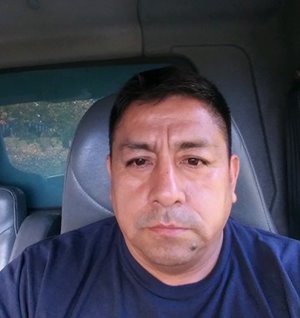Just before COVID-19 hit, and with it, the stay-at-home orders, Dora Kellogg was in a car accident. Her car was totaled, she says. She had pain on her right side. She had pain on her left side. Kellogg also has asthma and heart disease. The combination prompted her doctor to insist that she stay home from her daily job.
 Normally, Kellogg is a direct support professional who works with two disabled individuals. She was assigned to work with them in their homes, to walk with them around the community, to accompany them to the museum or medical appointments. But after COVID, she says, the work seemed too risky and she needed to spend time on her own physical therapy. She took her doctor's advice.
Normally, Kellogg is a direct support professional who works with two disabled individuals. She was assigned to work with them in their homes, to walk with them around the community, to accompany them to the museum or medical appointments. But after COVID, she says, the work seemed too risky and she needed to spend time on her own physical therapy. She took her doctor's advice.
For the first three months, Kellogg, who lives in Montgomery County, Maryland, managed to submit her rent on time. But in July, she says, she couldn't do it. She called the property manager. "I said I could not pay."
But Montgomery Housing Partnership, Inc., (MHP) which is the developer of Kellogg's apartment and 2,200 other affordable apartment homes, helped her, using a Rental Resilience grant the organization received through a partnership with NeighborWorks America and the Wells Fargo Foundation. MHP was alerted to Kellogg's issues through an outreach program they began as property managers reported more residents in crisis. The managers collected the names, and an outreach team followed up. Their work includes helping residents sign up for unemployment benefitis, rental assistance, food and more.
Martina Tinong, who was reassigned to work with residents, is one of four people who speaks with them regularly to find out what's working in their lives and to try to fix what isn't. Tinong was able to help Kellogg with her rent and with resources for food.
"She is an angel to me," Kellogg says of Tinong. "She will listen to me. She will find out how I'm doing. God will surely bless her heart."
Kellogg's grown children often come by to help her out. But Tinong says a lot of the households she reaches have young children at home. When those families are helped with the Resilience fund, "the immediate reaction is to be able to purchase food for the family and eventually to pay off rent. Those are the two things at the top, the food and the rent." When MHP helps, she says, "at least for the moment, they don't have to worry."
 Families have different reasons for not being able to work. Some, like Kellogg, have medical conditions. Some have children who are at home instead of in school and need a family member to look after them. Some have "gig" jobs, like Lyft and Uber drivers, who saw their business fall off. Tinong speaks of one family where the breadwinner lost his life to COVID. In addition to coping with their loss, his family is still dealing with medical bills.
Families have different reasons for not being able to work. Some, like Kellogg, have medical conditions. Some have children who are at home instead of in school and need a family member to look after them. Some have "gig" jobs, like Lyft and Uber drivers, who saw their business fall off. Tinong speaks of one family where the breadwinner lost his life to COVID. In addition to coping with their loss, his family is still dealing with medical bills.
Jose Isidro Gandulios also tested positive for COVID-19. He came home from his work at a moving company with an aching body. Even his bones hurt, Gandulios says through Fatima Coreas, an outreach member at MHP who translated for him.
Gandulios tried to recover at home, but when he had trouble breathing, he called 911. He was in the hospital for 20 days. While he was there, he says, his wife and his daughter, 10, and son, 9, also tested positive.
"My wife had to push through this crisis because I was hospitalized," he says. "She was the only one at home with the kids."
His biggest fear? "Dying," he says.
Gandulios left the hospital with tanks of oxygen. He was out of work for three and a half months. Even before he was diagnosed with COVID, his hours had been cut. He was falling behind on rent. But MHP called him his third day in the hospital, he says. They helped him reach out to other county programs, to make sure his family's needs were met.
One of the things he is grateful for, he says, is that first call from Coreas. "You reached out in one of my hardest moments," he says. "Even though you did not know me, you took the time to call me and help with this process."
Coreas says that the MHP emergency fund, which includes grants from the NeighborWorks and Wells Fargo Foundation partnership, helped Gandulios catch up with his rent. He also received a grant from Montgomery County. He is now caught up on his bills and working not to get behind. "I am feeling so much better now," he says. "Last week I was on light duty but now I am on full duty, working hard."
While Gandulios lives in Montgomery County, Maryland, Tinong says residents of their DC property, Worthington Woods, have seemed to struggle more than residents at other properties. "That property has the highest rental balance," she says, referring to residents who have been unable to pay monthly expenses. Some Rental Resilience funding will go toward a site coordinator who will be able to work as the outreach team does, she says, directing residents toward resources.
NeighborWorks, with help from the Wells Fargo Foundation, has contributed to those resources through emergency grants. "During times of crisis, when the needs of residents are at their greatest, it takes the community coming together to extend a hand to help," says Robert Goldman, president of MHP. "It’s tremendous to see how NeighborWorks America and Wells Fargo have stepped up during the pandemic to be part of this community effort and make a difference in the lives of so many."
NeighborWorks and the Wells Fargo Foundation collaborated early on to provide resources as organizations responded to unprecedented community needs. MHP and other organizations say they're grateful for the grants – and grateful to continue helping their residents.
11/04/2020

